The Estrobolome: How the Gut Impacts Estrogen Levels, Metabolism and More! {Lifestyle Medicine | Women’s Health | Hormones | Functional Nutrition | Pure}
The Estrobolome: Learn How the Gut Impacts Estrogen Levels, Metabolism and More and How to Bring Your Hormones Into Balance with Lifestyle Medicine!
{Lifestyle Medicine | Women’s Health | Hormones | Functional Nutrition | Pure}
The microbiome has been receiving increasing attention in recent years. This collection of microbes on and within your body has wide-reaching impacts on your health (Selber-Hnatiw et al., 2017), influencing everything from the absorption of nutrients and mood to metabolism and immunity.
Emerging research is shedding light on specific microbes within your gut microbiome (Shreiner,Kao, Young, 2016) which play a central role in the regulation of hormones (Clarke et al., 2014) such as estrogen within the body. This so-called estrobolome (Plottel & Blaser, 2012) influences the metabolism of various forms of estrogen and therefore the risk of developing estrogen-related diseases such as endometriosis, breast cancer, and prostate cancer (Kwa et al, 2016).
You can find more lifestyle medicine tips, healthy recipes, natural living strategies and more on my YouTube Channel!
Affiliate Disclosure & Privacy Policy (please review our complete policy here): we use affiliate links and analytics on our website, social media posts and newsletter which utilize cookies placed on your browser to track sales activity. This post is NOT sponsored but may contain affiliate links. These statements have not been evaluated by the FDA and should not be considered medical advice or treatment. Please consult your personal health provider before making any changes to your diet or lifestyle.
The Many Facets of Estrogen
Estrogen plays many vital roles in the human body including influencing the regulation of body fat, female reproductive function, cardiovascular health, bone turnover, memory function and cell replication. Estrogen is not just a female hormone and also plays important roles in aspects of men’s health such as the maturation of sperm and maintenance of libido.
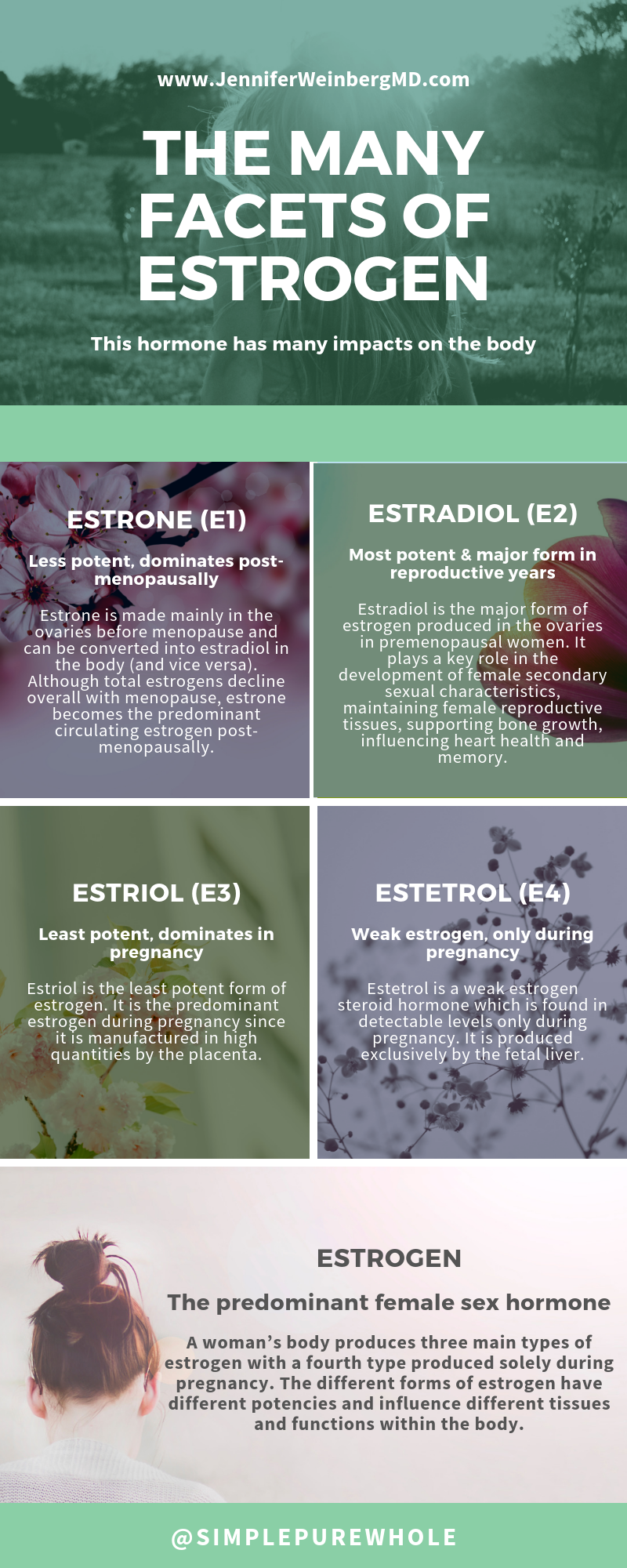
A woman’s body produces three main types of estrogen. The different forms of estrogen (Cui, Shen, Li, 2013) have different potencies and influence different tissues and functions within the body.
- Estrone (E1): Estrone is made mainly in the ovaries before menopause and can be converted into estradiol in the body (and vice versa). Although total estrogens decline overall with menopause, estrone becomes the predominant circulating estrogen post-menopausally. It has less potent impacts, relative to estradiol.
- Estradiol (E2): Estradiol is the major form of estrogen produced in the ovaries in premenopausal women and is also produced by the adrenals and placenta. It is the most potent form of estrogen during the reproductive years in terms of absolute serum levels as well as estrogenic activity. Estradiol plays a key role in the development of female secondary sexual characteristics such as breasts and a feminine pattern of fat distribution. Estradiol is also important for maintaining female reproductive tissues, supporting bone growth, influencing heart health and memory. This form of estrogen is thought to play a role in diseases such as endometriosis, fibroids and cancers of the uterus, ovaries and breasts.
- Estriol (E3): Estriol is the least potent form of estrogen. It is the predominant estrogen during pregnancy since it is manufactured in high quantities by the placenta.
Estrogens are also produced by gut bacteria and can be obtained from the environment as well. Some are produced by plants (phytoestrogens) which may be consumed as food while others are made synthetically (xenoestrogens) and found in common household products such as fragrances, pesticides and plastics.
Toxins such as xenoestrogens are absorbed by the body and stored in the liver and fat cells. They can act additively with endogenously produced estrogens (Diamanti-Kandarakis et al., 2009), influence cell proliferation or otherwise disrupt the hormonal balance of the body.
These different forms of estrogen interact and influence one another in the body, so the overall balance of the major forms and their metabolites (Obi et al., 2011) plays a key role in modulating disease risk. The ratios of hormones and their appropriate metabolism and excretion impact your risk of inflammatory, autoimmune, and malignant diseases. For example, hormonal balance of estrogen is essential for maintaining healthy cholesterol levels, proper bone density, a balanced mood and functioning memory.
The Gut-Hormone Connection and the Estrobolome
The human gut microbiome exerts both local and wide-reaching effects. For example, a subset of microbes within the gastrointestinal tract impacts the metabolism of the various forms of estrogens and the balance of circulating and excreted hormone levels. These microbes are collectively referred to as the estrobolome (Plottel & Blaser, 2012).
Microbes in the estrobolome produce beta-glucuronidase (Baker, Al-Nakkash, Herbst-Kralovetz, 2017). This enzyme alters estrogens into their active forms which can bind to estrogen receptors and influence estrogen-dependent physiological processes. In general, the more beta-glucuronidase that the microbes in your gut produce, the less estrogen is excreted out of the body so that more remains within the body to be recirculated, bind to receptors and exert their influence on various physiologic processes.
When the gut microbes are out of balance (a state known as dysbiosis), beta-glucuronidase activity may be altered. In addition to variable levels of this enzyme activity, intestinal microbial richness overall also influences the balance of estrogens circulating in the body (Goedert et al, 2015). This dysbiosis can lead to either a deficiency or an excess of free estrogen and imbalances between the various forms of estrogen and other hormones which may promote the development of estrogen-related pathology and chronic diseases.
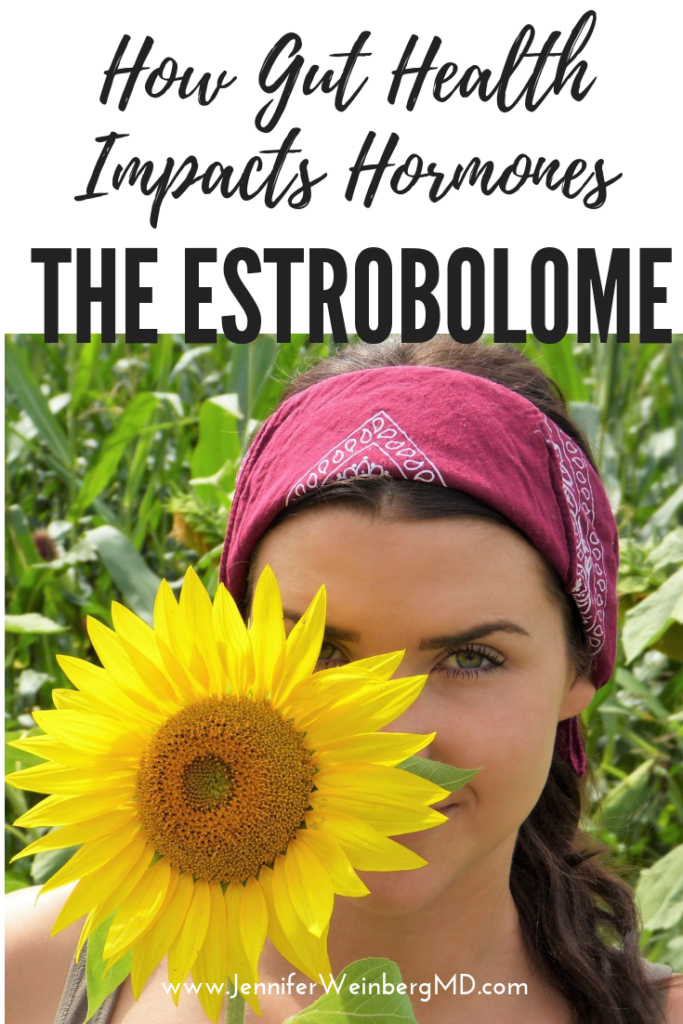
Dysbiosis of the Estrobolome and Chronic Disease
Given the various roles that estrogen plays in the human body, it is not surprising that gut dysbiosis which alters the estrobolome has been associated with the development of several chronic diseases. Overall, some of the most common signs of imbalanced estrogen and other hormones include (Neuman et al., 2015):
- Bloating and digestive upset
- Acne
- Low libido
- Heavy, light or irregular periods
- Tender, swollen and/or fibrocystic breasts
- Headaches
- Weight gain
- Hot flashes
- Endometriosis
- Fibroids
- Mood swings
- Polycystic ovarian syndrome (PCOS)
- Cancers of the breast, uterus, ovaries or prostate (Fernández et al., 2018)
For example, estrobolome disruption in postmenopausal women is associated with an increased risk of obesity (Lizcano & Guzmán, 2014), cardiovascular disease (Baker et al., 2003), and loss of bone density (Li et al., 2016) such as osteoporosis.
Other research suggests that the estrobolome of both the gastrointestinal tract and vagina in women with endometriosis may have larger numbers of beta-glucuronidase-producing bacteria, leading to increased levels of circulating estrogens and inflammation which drive endometriosis (Puca & Hoyne 2016).
Polycystic ovary syndrome (PCOS) is another condition which seems to be influenced by the balance of microbes in the estrobolome (Guo et al., 2016). Studies suggest that imbalanced gut microbiota may promote increased androgen biosynthesis and decreased estrogen levels through lowered beta-glucuronidase activity which contributes to hormonal imbalances characteristic of PCOS (Lindheim et al., 2017).
Emerging research also links dysbiosis of the estrobolome to various forms of cancer. This altered balance of gut microbes leads to increased levels of circulating active estrogens, which promote cell proliferation in estrogen-sensitive tissues such as the breasts, endometrium, cervix and ovaries.
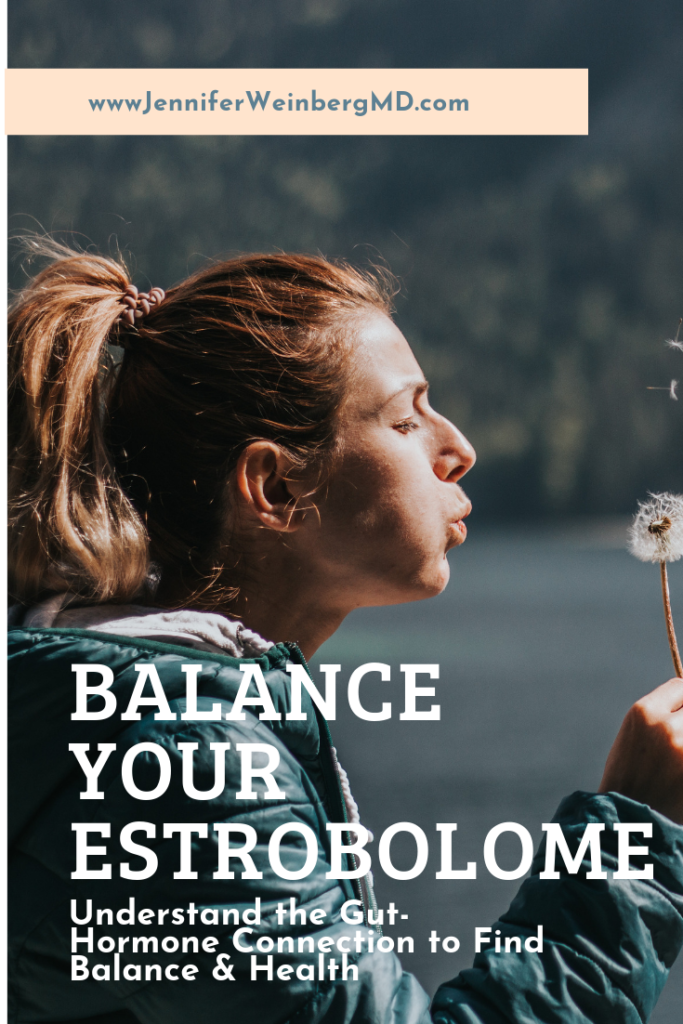
Balancing Your Estrobolome
The composition of your estrobolome is influenced by many factors including genetics, diet, alcohol intake, environmental exposures, and medications, especially antibiotics and hormonal contraceptives (Kwa et al., 2016). Therefore, you can support a healthy estrobolome and balance of estrogen in your body through a combination of detoxification, diet and supplementation to encourage the body to restore this delicate balance. It is important to work in conjunction with a knowledgeable provider to individualize an approach that considers your unique body, genetics and needs.
Eat a Hormone Balancing Diet
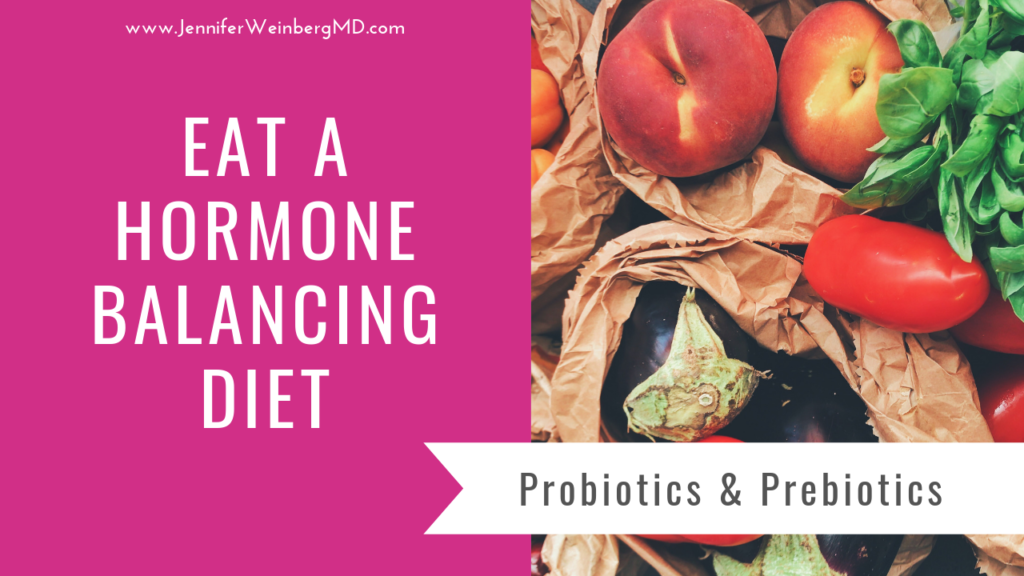
Diet strongly influences the composition of the estrobolome (Harmon et al., 2015). Several dietary factors may have a positive impact on the estrobolome.
- Fermented foods such as sauerkraut, kim chee and kvass help to rebalance gut bacteria and increase diversity.
- Probiotics strains such as Lactobacillus plantarum and bifidobacteria species can help decrease bacteria which produce beta-glucuronidase (Goldin et al., 1980).
- Prebiotic foods which are rich in fructo-oligosaccharides or inulin help to promote the growth of beneficial bacteria (Gibson, 2008). These include chicory, asparagus, garlic and Jerusalem artichokes.
- Plant-based foods high in dietary fiber (Monroe et al., 2007) like nuts, seeds, legumes, beans and a variety of vegetables support healthy gut bacteria and lead to more balanced levels of estrogen.
- Cruciferous vegetables such as broccoli, cauliflower, cabbage, and kale are helpful in regulating beneficial gut bacteria (Li et al., 2009), supplying fiber to keep the gut healthy and supporting healthy detoxification of hormones including estrogen.
Reduce Toxicity

Many man-made compounds, known as xenoestrogens, can mimic natural estrogens in the body as well as alter the composition of the microbiome (Watson, Hu & Paulucci-Holthauzen, 2014). There are several steps you can take to reduce your exposure to xenoestrogens in everyday life.
- Minimize your use of plastics such as plastic water bottles and food containers, especially when heated.
- Be mindful of what you put on and in your body when it comes to personal care products. Avoid synthetic fragrances, phthalates, stearalkonium chloride and parabens which can impact estrogen balance. Here are some healthier non-toxic options I like.
- Use all-natural, biodegradable laundry and household cleaning products (affiliate links).
- Choose unbleached chlorine-free products such as coffee filters, tea bags, sanitary products, and toilet paper or switch to reusable organic cotton options when possible (affiliate links).
- Opt for organic food whenever possible.
Exercise for Hormone Health

Exercise is another great way to support detoxification and reduce stress to keep your hormones balanced. Physical activity helps to balance circulating levels of estrogen in both the short and long-term (Ennour-Idrissi, Maunsell & Diorio, 2015).
Studies suggest that maintaining an active lifestyle throughout life beginning during adolescence may reduce the risk for breast cancer (Bernstein, 2009). In addition, regular moderate intensity exercise can lower levels of circulating estrogens and increase levels of a protein called sex hormone binding globulin (SHBG) that binds up free-estrogen in the serum to help regulate cirulating levels of free, biologically-available estrogens which can act on your tissues (McTiernan et al., 2004).
When it comes to exercise, more isn’t always better though. Be mindful of what works best for your body and don’t overdo it. Stress, even from positive habits like exercise, can trigger hormonal imbalances as well. Listen to your body, take time for recovery in between workouts and balance rest with mindful activity.
Lifestyle, nutrition, physical activity and stress management are all linked to the balance of your hormones. These lifestyle and dietary habits can help you balance your estrobolome and keep your hormones healthy!
Do you struggle with hormonal issues?
I would love to have you in my Insider’s Community! Join for free and receive your FREE Chapters from The Whole Cure: 52 Essential Prescriptions to Overcome Overwhelm, Reclaim Balance and Reconnect with a Life You Love! You can pick up a full paperback or Kindle copy on Amazon for a wealth of insights, exercises and complete toolkit to help you uncover your true passions, authentic purpose and calm confidence as well!
Hypothyroidism in Infants: Functional and Integrative Medicine Testing and Treatment Options
Share this post:Share on PinterestShare on X (Twitter)Share on FacebookShare on LinkedInShare on EmailHypothyroidism in Infants: Functional Medicine Testing and Treatment Options A functional medicine approach to hypothyroidism in infants uncovers the root cause(s) of why the thyroid is under-functioning and helps restore balance to regulate metabolism and prevent complications from developing. The thyroid gland […]
How To Detect Hypothyroidism in Children and Adolescents
Share this post:Share on PinterestShare on X (Twitter)Share on FacebookShare on LinkedInShare on EmailHypothyroidism in Children and Adolescents Hypothyroidism in children can cause wide-reaching issues if not detected and treated. The thyroid is the butterfly-shaped gland that is part of the endocrine system. It is found at the base of the neck and produces hormones that […]
Hypothyroidism: A Functional Medicine Approach to Treating Hypothyroidism Naturally
Share this post:Share on PinterestShare on X (Twitter)Share on FacebookShare on LinkedInShare on EmailHypothyroidism: A Functional Medicine Approach to Treating Hypothyroidism Naturally This Article Was Originally Published on Rupa Health The thyroid is the butterfly-shaped gland at the base of your neck that produces hormones that are essential for regulating metabolism, body temperature, energy, heart […]
POTS: A Functional Medicine Approach
Share this post:Share on PinterestShare on X (Twitter)Share on FacebookShare on LinkedInShare on EmailPOTS: A Functional Medicine Approach This Article Was Originally Published on Rupa Health” Postural orthostatic tachycardia syndrome (POTS) is a form of dysautonomia or dysfunction of the autonomic nervous system that can cause debilitating and unpredictable lightheadedness and rapid heart rate upon standing. […]
Non-Invasive Vagus Nerve Stimulation for Digestion, Inflammation, and Mood
Share this post:Share on PinterestShare on X (Twitter)Share on FacebookShare on LinkedInShare on EmailNon-Invasive Vagus Nerve Stimulation for Digestion, Inflammation, and Mood Cranial nerve ten, the vagus nerve, plays a key role in facilitating communication between the brain and digestive tract. The tone and balance of your vagus nerve impact so many aspects of health, […]
To keep building your healthy lifestyle and best self through everyday habits, take the next step today to commit to a life you truly love and feel fully alive!
-
Pick up a copy of The Whole Cure to build resilience and manage stress in a way that makes life flow with greater ease and joy!
-
Access guided relaxation exercises utilizing the power of the breath and mind here.
-
Join my next online group Whole Cure Lifestyle Transformation Programs to build more powerful coping strategies and skills for meaningful stress management and a calmer life! Contact me to form your own guided online group or register for the next scheduled online program!
Medical Disclaimer: Information provided in this post and related resources are for informational purposes only. Jennifer Weinberg is not providing medical advice, diagnosis or treatment information. The information is NOT intended as a substitute for the advice provided by your physician or other healthcare professional. Every body is unique so be sure to check with your healthcare professional before making any dietary or lifestyle changes taking any medication or nutritional supplement or using any treatment for a health issue. Do not use this information provided for diagnosing or treating a health problem or disease. If you suspect you have a medical problem please contact your healthcare provider promptly and do not disregard professional medical advice based on anything on this website. This website and related resources are not intended to diagnose, treat, cure or prevent disease and do not create a doctor-patient relationship between you and Jennifer Weinberg. These statements have not been evaluated by the FDA. These products are not intended to diagnose, treat, cure, or prevent any disease.
This post was shared with: Home Matters Link Party
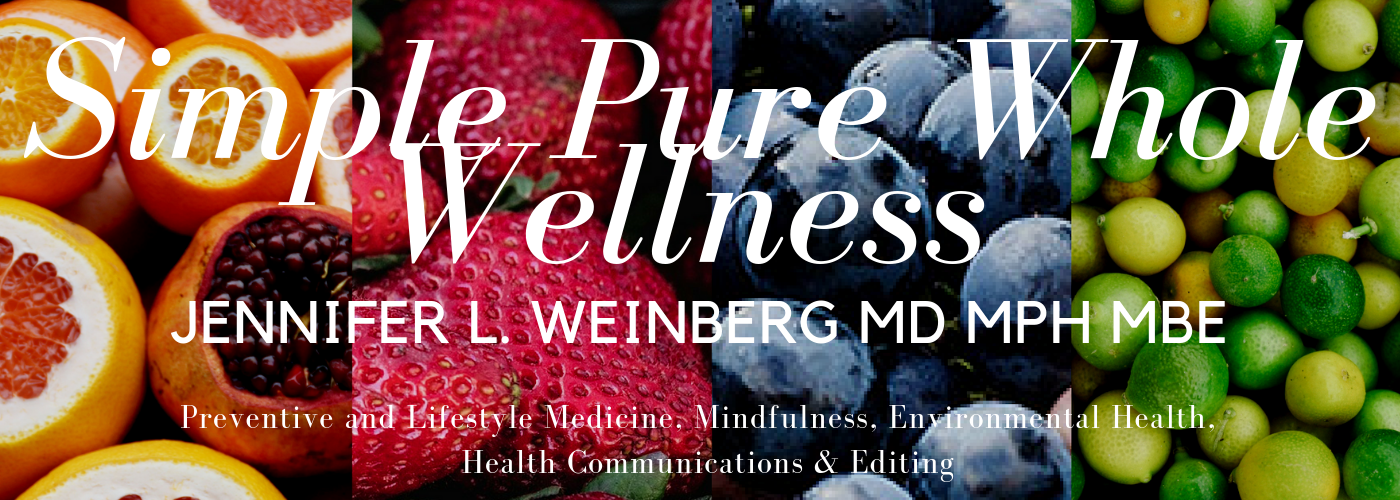

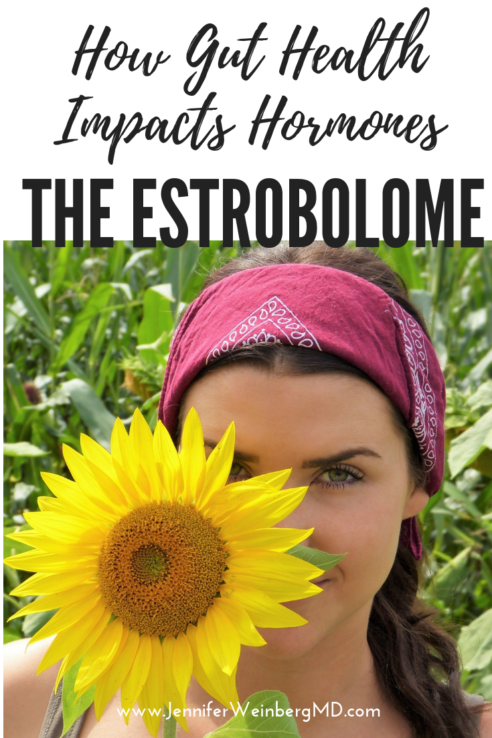
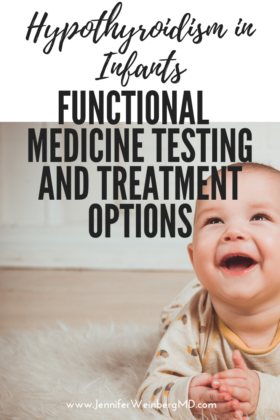

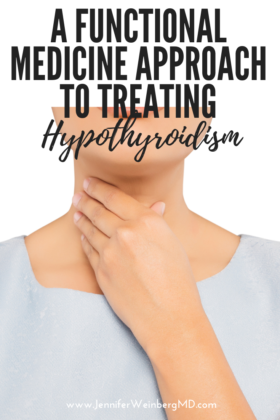
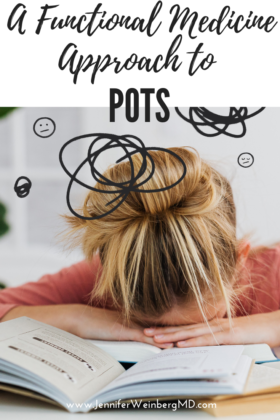

Comments